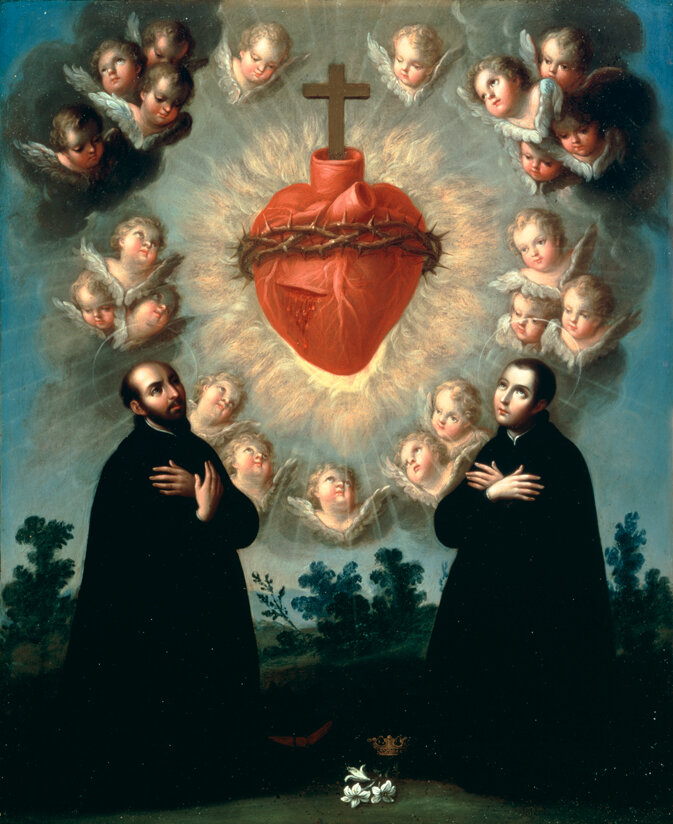Solemnity of the Most Sacred Heart of Jesus
The Feast of the Most Sacred Heart of Jesus, (Latin: Sollemnitas Sacratissimi Cordis Iesu) is a solemnity in the liturgical calendar of the Roman Catholic Church. It falls 19 days after Pentecost, on a Friday.
Devotion to the Sacred Heart of Jesus can be clearly traced back at least to the eleventh century. It marked the spirituality of Saint Bernard of Clairvaux in the twelfth century and of Saint Bonaventure and St. Gertrude the Great in the thirteenth. The beginnings of a devotion toward the love of God as symbolized by the heart of Jesus are found even in the fathers of the Church, including Origen, Saint Ambrose, Saint Jerome, Saint Augustine of Hippo, Saint Hippolytus of Rome, Saint Irenaeus, Saint Justin Martyr and Saint Cyprian, who used in this regard John 7:37-39 and John 19:33-37. The first liturgical feast of the Sacred Heart was celebrated, with episcopal approval, on 31 August 1670, in the major seminary of Rennes, France, through the efforts of Saint John Eudes. in 1856, Pope Pius IX established the Feast of the Sacred Heart as obligatory for the whole Church, to be celebrated on the Friday after the Octave of Corpus Christi.
In Year A the first reading is from the book of Deuteronomy (7:6-11). In it we hear Moses’ telling the people of Israel “If the Lord set his heart on you and chose you, it was not because you outnumbered other peoples; you were the least of all peoples.” In the second reading is from the first letter of St John (1 John 4:7-16) we hear John’s words “God’s love for us was revealed when God sent into the world his only Son so that we might have life through him.” In the Gospel from Matthew (11: 25-30) Jesus invites us with the words “Come to me, all you who labour and are burdened and I will give you rest.”
In Year B the first reading is from Hosea (11:1.3-4, 8-9). In it God speaks of his love for his people “When Israel was a child I love him, and I called my son out of Egypt. I took them in my arms…I led them with reins of kindness, with leading-strings of love…I am the Holy One in your midst and have no wish to destroy.” In the second reading from Paul’s letter to the Ephesians (3:8-12.14-19) Paul prays that the Father “Out of his infinite glory, may he give you the power through his Spirit for your hidden self to grow strong, so that Christ may live in your hearts through faith, and then, planted in love and built on love, you will with all the saints have strength to grasp the breadth and the length, the height and the depth; until, knowing the love of Christ, which is beyond all knowledge, you are filled with the utter fullness of God.” In the Gospel from John (19:31-37) we hear of the soldier piercing the side of Jesus “When they came to Jesus, they found he was already dead, and so instead of breaking his legs one of the soldiers pierced his side with a lance; and immediately there came out blood and water. This is the evidence of one who saw it – trustworthy evidence, and he knows he speaks the truth – and he gives it so that you may believe as well. Because all this happened to fulfil the words of scripture: Not one bone of his will be broken and again, in another place scripture says: They will look on the one whom they have pierced.
In Year C the first reading is from Ezekiel (34:11-16) the prophet speaks of the Lord God caring for his people, as a shepherd his flock “I myself will pasture my sheep, I myself will show them where to rest – it is the Lord who speaks. I shall look for the lost one, bring back the stray, bandage the wounded and make the weak strong. I shall watch over the fat and healthy. I shall be a true shepherd to them.” In the second reading from Paul’s letter to the Romans Paul reminds us that “the love of God has been poured into our hearts by the Holy Spirit which has been given us.” In the Gospel from Luke (15:3-7) we hear the parable of the lost sheep “‘What man among you with a hundred sheep, losing one, would not leave the ninety-nine in the wilderness and go after the missing one till he found it? And when he found it, would he not joyfully take it on his shoulders and then, when he got home, call together his friends and neighbours? “Rejoice with me,” he would say “I have found my sheep that was lost.” In the same way, I tell you, there will be more rejoicing in heaven over one repentant sinner than over ninety-nine virtuous men who have no need of repentance.”
